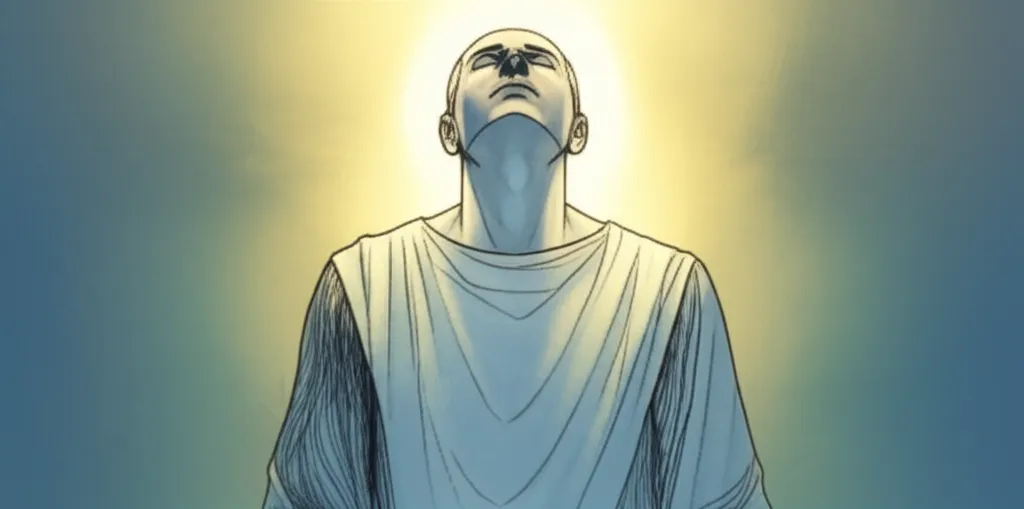In the tapestry of our daily lives, threads of stress, anxiety, and uncertainty are often interwoven, creating a pattern that feels heavy and overwhelming. Yet, within the ancient words of Scripture, we find a timeless invitation to unburden ourselves, to seek solace and strength in the divine embrace. Today's readings offer a powerful message of hope and liberation, reminding us that we are not alone in our struggles and that a path to true rest exists.
The God Who Is
In the book of Exodus, Moses encounters God in the burning bush, a theophany that reveals not only divine power but also profound intimacy. When Moses asks for God's name, the response is "I AM WHO AM" (Exodus 3:14). This isn't merely a label but a declaration of God's eternal, self-sufficient existence. It speaks to a God who is present, who is active, and who is intimately involved in the lives of His people.
This divine self-revelation echoes through the centuries, reminding us that God is not a distant, abstract concept but a living reality. He is the God of Abraham, Isaac, and Jacob, a God of covenant and promise. In our moments of doubt and fear, we can cling to this truth: the God who led the Israelites out of slavery is the same God who walks with us today, offering liberation from the burdens that weigh us down.
One of the early Church Fathers, in his letter to the Corinthians, emphasized the importance of unity and order within the community, drawing parallels with the natural world and the Roman civic order. Similarly, we can find order and peace in our lives by recognizing God's presence and authority, trusting in His plan even when we don't understand it.
A Covenant Remembered
The Responsorial Psalm reinforces this theme of divine faithfulness. "The Lord remembers his covenant forever" (Psalm 105:8). This is a testament to God's unwavering commitment to His promises. In a world where commitments are often broken and trust is easily betrayed, this assurance is a beacon of hope.
The psalm reminds us of the wondrous deeds God has wrought throughout history, from the Exodus to the signs and wonders performed by Moses and Aaron. These acts of salvation are not just historical events but living reminders of God's power to intervene in our lives, to deliver us from our own personal "Egypts" of sin, despair, and oppression.
The Invitation to Rest
The Gospel reading from Matthew offers a direct and personal invitation from Jesus himself: "Come to me, all you who labor and are burdened, and I will give you rest" (Matthew 11:28). This is not a promise of a life free from challenges but an offer of inner peace and strength to face those challenges with grace and resilience.
Jesus invites us to take his yoke upon us, to learn from him, for he is "meek and humble of heart" (Matthew 11:29). The yoke is a symbol of submission and obedience, but it is also a symbol of partnership. By yoking ourselves to Christ, we align ourselves with his will, allowing him to guide us and carry our burdens alongside us.
One of the great biblical scholars of the Church, dedicated his life to translating the Scriptures, understood the importance of immersing oneself in the Word of God. He believed that a deep understanding of Scripture was essential for spiritual growth. Similarly, by studying the life and teachings of Jesus, we can learn to cultivate the virtues of meekness and humility, finding true rest in his loving presence.
Embracing the Light Burden
The promise that Jesus' "yoke is easy, and my burden light" (Matthew 11:30) may seem paradoxical. How can a yoke, a symbol of labor and responsibility, be easy? The answer lies in the nature of Christ's love. His yoke is not one of oppression but of liberation. It is a yoke of grace, of forgiveness, and of unconditional acceptance.
When we carry our burdens alone, they can feel crushing and unbearable. But when we share them with Christ, he lightens the load, infusing us with his strength and peace. He transforms our struggles into opportunities for growth, our weaknesses into sources of grace.
One of the Cappadocian Fathers, a profound theologian and mystic, emphasized the infinite and incomprehensible nature of God and the soul's perpetual striving towards Him. This concept of continuous spiritual growth reminds us that the journey with Christ is not a one-time event but a lifelong process of learning, growing, and deepening our relationship with Him.
A Call to Action
Today's readings invite us to examine our lives and identify the burdens we are carrying. Are we trying to carry them alone, or are we turning to Christ for help? Are we clinging to our own strength, or are we surrendering to his loving guidance?
Let us take a moment to quiet our hearts and listen to the voice of God, who speaks to us in the midst of our struggles. Let us embrace the invitation to come to him, to take his yoke upon us, and to find true rest for our souls. For in his presence, we discover that even the heaviest burdens can be lightened, and even the most difficult journeys can be filled with hope and joy.
